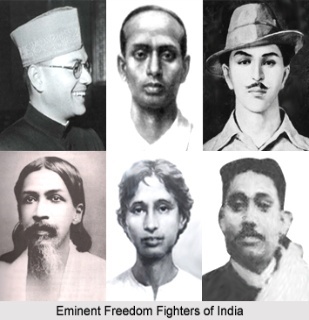The struggle for India’s independence was a
monumental movement that spanned over a century, characterized by the
relentless efforts of countless freedom fighters. These brave individuals,
driven by a fervent desire for freedom and justice, played pivotal roles in
shaping the destiny of the nation. Their sacrifices and ideologies continue to
inspire generations.
The roots of the Indian independence movement can be
traced back to the late 19th century, with figures such as Bal Gangadhar Tilak, who is often
regarded as the father of Indian unrest. Tilak advocated for self-rule and was
instrumental in mobilizing the masses through his famous slogan, "Swaraj
is my birthright." His efforts laid the groundwork for future leaders.
Lala Lajpat Rai, known for his fiery patriotism, also emerged during this period. He
led protests against oppressive British policies and was a prominent member of
the Indian National Congress. His unwavering commitment to the cause made him a
significant figure in the early stages of the freedom struggle.
The early 20th century saw the emergence of several
influential leaders. Mahatma Gandhi,
a pivotal figure in India’s quest for independence,
introduced the principles of non-violent resistance, or Satyagraha. Gandhi’s
leadership during the Salt March in 1930 exemplified his strategy of peaceful
protest against British taxation. His philosophy inspired millions and became a
cornerstone of the Indian independence movement.
Another prominent leader, Jawaharlal Nehru, was a close ally of Gandhi. As the first Prime
Minister of India, Nehru emphasized socialism and modernization, envisioning a
secular and progressive nation. His speeches and writings galvanized the youth
and instilled a sense of hope and determination in the masses.
While many freedom fighters advocated non-violence,
others believed in a more radical approach. Bhagat Singh, a young revolutionary, became an icon of resistance
against British rule. His fearless acts, including the assassination of British
police officer John Saunders, aimed to inspire the youth to rise against
oppression. Bhagat Singh’s eventual martyrdom in 1931 turned him into a symbol
of bravery and sacrifice.
Subhas Chandra Bose was another formidable leader who believed in armed struggle against
colonial rule. He founded the Indian National Army (INA) to fight the British
and sought support from Axis powers during World War II. Bose’s call for
"Give me blood, and I shall give you freedom!" resonated deeply with
those yearning for liberation.
The fight for independence
was not limited to men; women played an essential role as well. Sarojini Naidu, known as the
“Nightingale of India,” was a prominent figure in the Indian National Congress.
She fought for civil rights and women’s empowerment, and she became the first
woman to serve as a governor in independent India.
Today, the ideals of unity, courage, and
selflessness championed by these freedom fighters remain relevant as India
navigates its democratic journey. As the nation reflects on its past, the
legacy of these heroes serves as a reminder of the struggle for justice and
equality, encouraging citizens to uphold the values for which they fought so
valiantly.

No comments:
Post a Comment